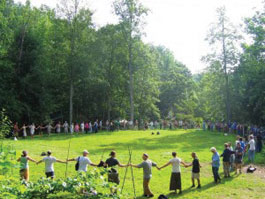home | north bay bohemian index | features | north bay | green zone

Crucial Culture
Occidental conference explores 'Art of Community'
By Juliane Poirier
At least half of the climate crisis is a people-skills crisis; in order to implement even the most brilliant ideas and technologies, humans have to be able to overcome their differences and cooperate. Anyone who works in a group knows that the trust and harmony required to succeed can quickly be squashed by fear-based negativity from even one person.
So what does it take to get people to work together without arguing? I asked Susan Frank, who went back to college in her 40s to answer just that question. "For me, sustainability is all about the sociology," Frank says. "I went looking for the organizing principle behind sustainability, not the science."
To that end, Frank is the coordinator of the three-day conference "Art of Community: Creating Sustainable Culture Through Cooperation," to be held Sept. 23–25 at Westminster Woods in Occidental. Frank claims that the collective wisdom about getting along in groups comes largely from experiences of intentional communities, from eco-villages and cooperative housing communities to student cooperatives.
"In California alone there are about 225 intentional communities either formed or being formed," Frank says, "and more than a dozen of them are in Marin, Sonoma and Napa counties."
The decades of combined experiences from those in intentional communities can benefit anyone who is part of a group, according to Frank. And the upcoming conference will present that knowledge in a hands-on way. "This is not one of those fill-your-head kinds of conferences," explains Frank. "It's an immersive experience."
The nonprofit heading the conference is the Fellowship for Intentional Community, or FIC, based in Missouri, and its membership includes communities all over the world. That's a big bank of experience to draw from.
"People can be in such a state with the economy the way it is," Frank says. "We have to learn to share. If we have the skills to be in community, to do it honestly and transparently and with a little love for our neighbors—as opposed to fear of them—we have a chance to become a more cooperative culture."
The Art of Community conference will offer workshops on building community, conflict resolution, decision making, nonviolent communication, community economics and more.
"We want to help people learn how to be in community wherever they live," Frank says, "so they can become more resilient, learn how to share food, cars and other resources, and learn how to do so legally, effectively and efficiently."
The Art of Community conference runs Friday–Sunday, Sept. 23–25. $195–$440. For more information and registration, see www.artofcmty.com.
Send a letter to the editor about this story.
|
|
|
|
|
|